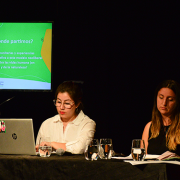Después de 20 horas de sesión, con 131 votos a favor, 117 votos en contra y 6 abstenciones, la Cámara de Diputados dio media sanción a la ley de Interrupción Voluntaria del Embarazo. Esta semana inicia el tratamiento el Senado, con reuniones de comisiones y un nuevo dictamen que será votado el 29 de diciembre.
“Below, we offer a google translate version of the original article in Spanish. This translation may not be accurate but serves as a general presentation of the article. For more accurate information, please switch to the Spanish version of the website. In addition, feel free to directly contact in English the person mentioned at the bottom of this article with regards to this topic”.
On Friday morning, after long hours of presentations by deputies and deputies, the vote on the IVE law was held, resulting in its half-sanction. While thousands of activists accompanied the discussion, from their homes or in public spaces in the vigils organized by the National Campaign for Legal, Safe and Free Abortion, the venue was once again filled with speeches for and against. Much of what we heard had already been said in the legislative treatment of 2018. It is that the scenario has not changed: the clandestinity of the practice poses a danger to life for pregnant people, and the possibilities of accessing it in conditions of legality and security are a matter of public health, social justice and human rights.
Deputy Gabriela Cerruti was in charge of making the closing speech of the majority opinion. Her words explain in a very simple way the sexual division of labor, and how women have historically been burdened with the responsibilities associated with reproduction and care. “It is not news that this world is unfair. […] We women know it perfectly, because for centuries they forced us to give birth to send our children to war. For centuries they forced us to give birth to exploit our kids in factories. […]. What we have come to ask you today is: stop making women’s bodies the territory of dispute of what the economy and politics cannot solve. The world is indeed unfair, but the answer is not in our womb. On the contrary: the world is unfair because it was built 500 years ago on a system based on the exploitation of women and nature. And we are the first to put ourselves in front of the battles that have to be fought to change that worldview of the world and so that the world is effectively for everyone, and so that we can live in a world in harmony, in a world better, in a world where we can all exercise our desire and our decision. “
At the end of the speech, he gave rise to an interpellation about the next discussions that should take place in our society: the distribution of care. “Care policies have to be part of State policies and they have to be part of our discussions because we have been the cheap labor that sustained this system in the last century. They would not have built their businesses, their fortunes, or their factories if we had not been in the houses taking care of the children, the parents and the husbands. We did it for centuries and we don’t want to do it anymore, or we want to do it when we decide to. Because choosing is not only choosing whether to be pregnant or not, choosing is choosing the life project, it is choosing at all times what we want to do ”.
How did the deputies vote according to their gender?
Voting results can be analyzed from several perspectives: by province, by party or political alliance, and by gender.
We are interested in specifying the latter. Of the total of 109 female deputies, 62 voted in favor, 45 against and 2 abstained. Of the total of 147 deputies, 72 voted against, 69 in favor, 4 abstained and 2 were absent. In other words, in proportion to the integration of the Chamber, it was the female vote that marked the trend in favor.
Este dato es importante para reforzar la importancia de la paridad de género en el Congreso. Las elecciones del 2019 fueron de estreno para la ley 27412 de paridad de género en ámbitos de representación política, y dieron como resultado un 10,3% de aumento en la proporción de mujeres que integran la Cámara. Y si comparamos el voto femenino de la votación de la ley de IVE de 2018 con el de 2020, el incremento es de casi un 20%.
All these data can be read in this report published by the Undersecretariat for Parliamentary Affairs of the Head of the Cabinet of Ministers of the Nation.
How is the opinion that was approved?
The approved bill is based on the one presented by the Executive Power, with the modifications introduced by the plenary of the committees prior to voting.
It is a law that establishes the right of women and people with other gender identities with the ability to gestate to decide to terminate pregnancy, request and access abortion care, and receive post-abortion care in the services of the health system.
Free access is planned until week 14 of gestation. Outside this period, access will only be possible in the event of rape or if the life or integral health of the pregnant person is in danger (that is, the causes that are already recognized in our legal system through article 86 of the Penal Code , with the interpretation made by the Supreme Court in the FAL ruling).
The term for access to the practice is 10 calendar days from its request, and the informed consent of the pregnant person expressed in writing is requested.
In cases of minors and people with disabilities or restricted capacity, referrals to the Civil and Commercial Code are provided to resolve whether they have the capacity to give consent and under what conditions they can do so.
Regarding conscientious objection, individual-type objection is allowed, and it is also indicated that those private health centers or social security centers that do not have professionals to carry out an abortion due to conscientious objection must foresee and order the Referral to a place, with similar characteristics, where the provision is actually made. On these points of the project we develop more in this note.
However, health personnel may not refuse to carry out the practice in the event that the life or health of the pregnant person is in danger and requires immediate and urgent care. Nor can conscientious objection be alleged to refuse to provide postabortion health care.
In addition, it strengthens the State’s responsibility to implement the Comprehensive Sexual Education law, and to establish active policies for the promotion and strengthening of sexual and reproductive health for the entire population.
What are the next steps in the Senate?
This Monday it is expected that the treatment of the project will begin in the Senate, with the presentation of members of the Executive Power before the plenary of the Justice, Health and Women’s Banking commissions. Tuesday and Wednesday will be dedicated to receiving specialists nominated by senators and senators. On Thursday, it is expected that there will be a discussion between members of the commissions to pass the opinion to signature, with the expectation of taking it to the site on December 29.
In this second instance of legislative discussion we reinforce our request for a respectful debate with arguments, and we hope that the voluntary interruption of pregnancy will be law before the end of the year.
Contacto
Mayca Balaguer, maycabalaguer@fundeps.org


